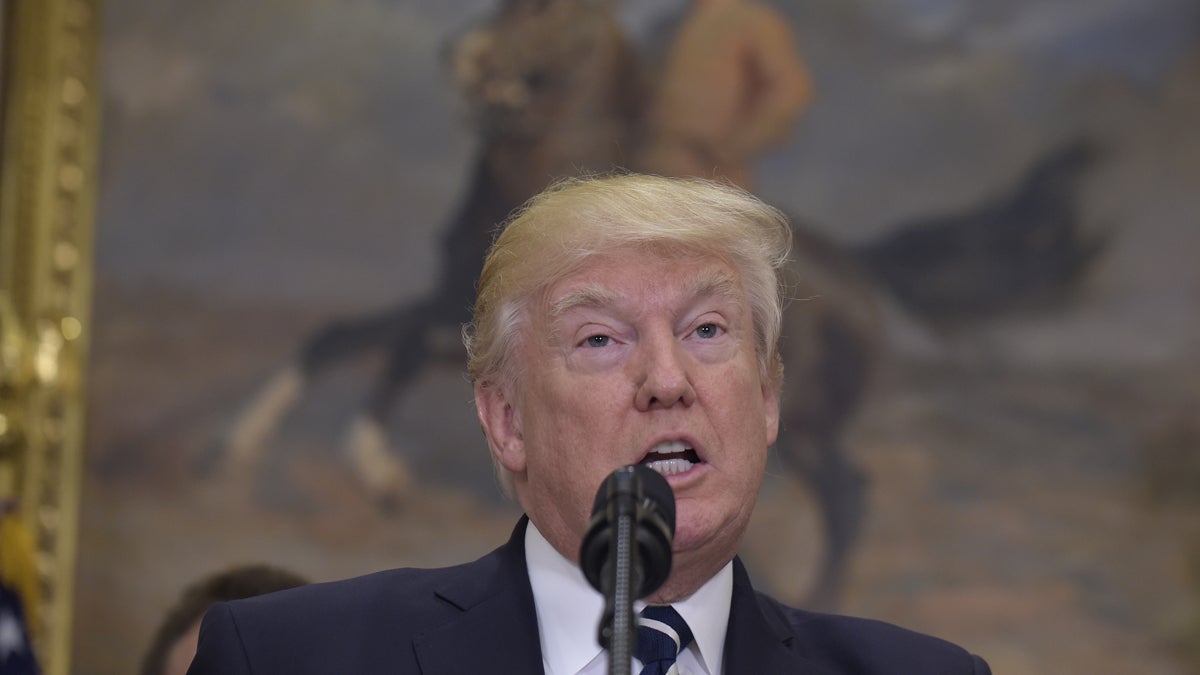Promoting civility in Washington in the age of Trump

President Donald Trump speaks about the shooting of House Majority Whip Steve Scalise of Louisiana at a baseball practice, Thursday, June 15, 2017, in the Roosevelt Room of the White House. (AP Photo/Susan Walsh)
President Trump said all the right things after five people were shot by a gunman at a GOP baseball practice in Alexandria, Virginia, last Wednesday. Emphasizing America’s shared heritage, he called on Democrats and Republicans to join hands across their differences. But by the next day he was back to his old ways, smearing anyone who opposes him as a crook or a liar.
And that creates a huge challenge for anyone who is trying to mend fences in our hyper-partisan, polarized political landscape. How do you create civility and unity — the new buzzwords on Capitol Hill — when you’ve got such a strident and divisive figure in the White House?
It won’t be easy. Put simply, Republicans will need to call out Trump every time he breaches our frayed norms of courtesy and decency. And Democrats will have to refrain from calling him names, lest their overheated rhetoric echo the president himself.
Let’s give credit where it’s due: in his first statement following Wednesday’s shooting, President Trump was truly presidential. “We may have our differences, but . . . everyone who serves in the nation’s capital is here because, above all, they love their country,” Trump declared. “We are strongest when we are unified and when we work together for the common good.”
Trump’s remark set the tone for a bipartisan love-in among members of Congress, who tripped over themselves in declaring allegiance to each other. “An attack on one of us is an attack on all of us,” Speaker Paul Ryan proclaimed, bringing the entire House of Representatives to its feet. Minority leader Nancy Pelosi struck a similar chord, noting that she prays for Democrats and Republicans — “all of us, together” — every Sunday.
And the catcher for the GOP’s baseball team, Illinois Rep. Rodney Davis, declared that he had simply had enough of Washington’s partisan rancor. “It’s my breaking point,” Davis said. “The way we talk to each other has to change. The political hate has to change.”
Within a few short hours, however, the nation’s president had returned to precisely the kind of politics that Davis denounced. “You are witnessing the single greatest WITCH HUNT in American political history—led by some very bad and conflicted people,” Trump tweeted on Thursday, regarding the Russia investigation.
He also blasted “Crooked H” (read: Hillary Clinton), claiming that she destroyed phones “with a hammer” in order to evade investigators in her email scandal. “And they talk about obstruction?” Trump asked.
And not a peep from his GOP colleagues in Congress, who sat on their hands about Trump even as they rose to their feet in a show of bipartisan unity. But if they really want to generate a new spirit of civility in politics, they’re going to have to speak up when the president of the country violates it.
And thus far, few Republicans have done that. True, Senate Majority leader Mitch McConnell told reporters last month that he’d prefer “a little less drama” from Trump, urging the president to to cut back on his tweets and “extracurricular comments.” And attorney George Conway — husband of Trump adviser Kellyanne Conway — said that Trump’s tweets about judicial rulings on immigration were undermining the president’s effectiveness.
But these comments took Trump to task on grounds of strategy, not of civility. What we need are Republicans who will raise their voices when Trump ridicules an opponent, whatever the issue at hand. You can’t proclaim your desire for a more decent style of discourse, then turn a deaf ear when your own president undermines it.
By the same token, though, Democrats who want bipartisan unity are going to have to tone down some of the language they use against Donald J. Trump. Consider Virginia Lt. Gov. Ralph Northam, who scored a 12-point victory in the state’s Democratic gubernatorial primary just a few days before the Alexandria shootings. A physician, Northam ran advertisements describing Trump as a “narcissistic maniac.”
Or take Rep. Maxine Waters (D-Calif.), who went on television earlier this year to call Trump’s cabinet “a bunch of scumbags.” That makes for great clickbait and TV ratings, but it hardly promotes the kind of civility that Democrats on the Hill were touting after the Alexandria tragedy.
Nor does the snark that emits routinely from Democratic media personalities, who have almost exceeded Trump’s own penchant for name-calling. Shortly before Trump was elected, writers for Samantha Bee’s “Full Frontal” released a list of over 40 epithets she had already called Trump on the air: “George Wallace in a wig,” “Casino Mussolini,” and many others that are too obscene to publish here.
Of course, there’s an important place for satire in politics. But my fellow Democrats can’t have it both ways, any more than Trump’s GOP apologists can. If they want a more civil politics, they need to start practicing it themselves. The alternative is to continue our descent into partisan invective, which both teams are resolved to avoid.
In that spirit, I’ve got a resolution of my own. From now on, I’m going to criticize what Trump does rather than who he is. So I’ll blast his senseless health-care package, but I won’t call him stupid. I’ll attack his bellicose foreign policy, but I won’t call him a bully. And while I’ll denounce every falsehood that he tells, I won’t call him a liar.
Labels don’t enhance our political discourse; instead, they constrict it. Donald Trump loves them, of course: loser, lightweight, moron, dummy. But the rest of us don’t have to follow along. We’ve reached our breaking point. And the way we talk to each other has to change.
WHYY is your source for fact-based, in-depth journalism and information. As a nonprofit organization, we rely on financial support from readers like you. Please give today.



